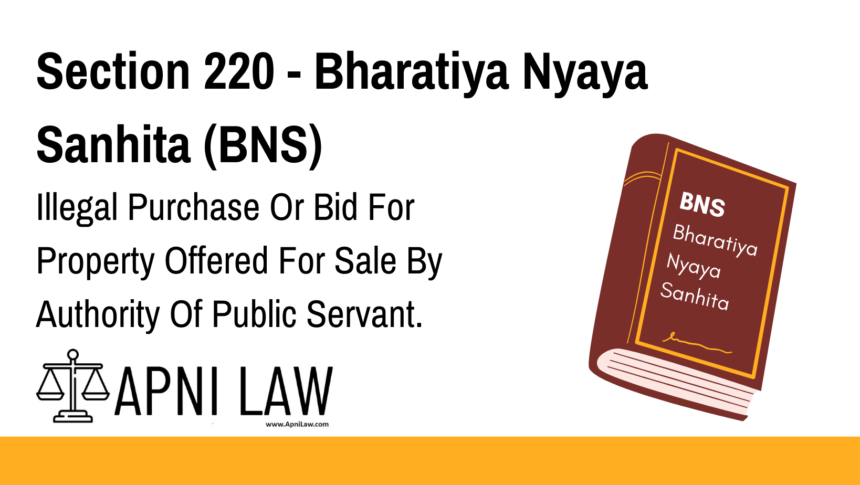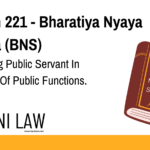Code: Section 220 BNS
Whoever, at any sale of property held by the lawful authority of a public
servant, as such, purchases or bids for any property on account of any person, whether
himself or any other, whom he knows to be under a legal incapacity to purchase that
property at that sale, or bids for such property not intending to perform the obligations
under which he lays himself by such bidding, shall be punished with imprisonment of
either description for a term which may extend to one month, or with fine which may
extend to two hundred rupees, or with both.
Explanation of Section 220 BNS
What Does Section 220 BNS Cover?
This section penalizes fraudulent bidding or illegal purchases in auctions conducted by public servants. It ensures that property sales remain fair and legally compliant.
Key Elements of the Offense:
- Bidding for a Legally Incapable Person
- The accused places a bid or buys property on behalf of someone legally prohibited from participating.
- Example: A government official bidding through a proxy in a state auction.
- Bidding Without Genuine Intention
- The accused places a bid but does not intend to complete the purchase.
- Example: A person bidding at an auction just to disrupt the sale.
- Punishment
- Imprisonment: Up to one month.
- Fine: Up to ₹200.
- Both: In serious cases, both penalties may apply.
Illustrations of Section 220 BNS
Example 1: Proxy Bidding by a Disqualified Person
A government official uses a friend to bid for a property in an official auction, despite being legally restricted from purchasing it. This is an offense under Section 220 BNS.
Example 2: Fraudulent Bidding to Disrupt an Auction
A businessman places a high bid in a government auction but never intends to pay. His actions disrupt the auction process, leading to legal consequences.
Example 3: Fake Bidder in a Seized Property Auction
A person deliberately bids without funds in an auction for tax-defaulted properties, preventing legitimate buyers from purchasing. This act is punishable under Section 220 BNS.
Common Questions and Answers on Section 220 BNS
1. What is the main objective of Section 220 BNS?
Section 220 BNS ensures that public auctions are conducted fairly and prevents fraudulent practices like proxy bidding or non-serious bids.
2. Can a legally restricted person bid in a government auction?
No, individuals who are legally disqualified (such as government officials in certain cases) cannot bid or purchase in government auctions.
3. What if a person unknowingly bids for someone legally restricted?
If a bidder was unaware of the legal incapacity of the person they were bidding for, they may not be held guilty under Section 220 BNS.
4. What are the legal defenses under Section 220 BNS?
A person may defend themselves by proving:
- They did not know the buyer was legally restricted.
- They had a genuine intention to complete the purchase.
5. How is Section 220 BNS different from Section 219 BNS?
- Section 219 BNS punishes those who obstruct a public property sale.
- Section 220 BNS punishes those who illegally bid or purchase in such sales.
Conclusion
Section 220 of the Bharatiya Nyaya Sanhita (BNS) protects government auctions from fraudulent or illegal bidders. Violators may face imprisonment or fines.
For more legal updates, visit ApniLaw today! 🚀








